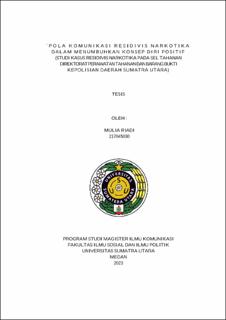| dc.description.abstract | This thesis aims to analyze how the communication patterns of narcotics
recidivist in fostering a positive self-concept. Narcotics recidivist differs from
narcotics prisoners in general because the title of recidivist is given to narcotics
prisoners who have been prisoned repeatedly. At the communication level,
recidivists need qualified communication therapy to prevent them recommitting
the similar crimes. Qualitative research is employed in this thesis using field study
approach. The primary data sources are collected from the interview and
observation results carried out with narcotics recidivists and North Sumatera
Regional Police Office. Data are collected using in-depth interviews, observation
and documentation. After the data are collected, the author analyzes the data
following several stages, namely: 1) Data Collection, 2) data condensation, 3)
data presentation and 4) conclusion. The results indicate that there are two
patterns of communication that occurs namely interpersonal communication
between recidivists and the wardens, and intrapersonal communication with
oneself for emotional management. After this process is carried out; several
positive self-concepts are found including: self esteem, self confidence, self image,
self respect, self acceptance, self compassion and self actualization. However,
some obstacles are found in implementing these positive self-concepts. These
obstacles include two primary factors, namely the interaction between the
recidivist environment and economic needs. Therefore, the research suggests that
to the police to continue to pay attention to the recidivists after they are released
from prison. It is suggested that one-year minimum education are provided for
them so that the positive self-concepts that have been formed can last longer and
will not fade. | en_US |


